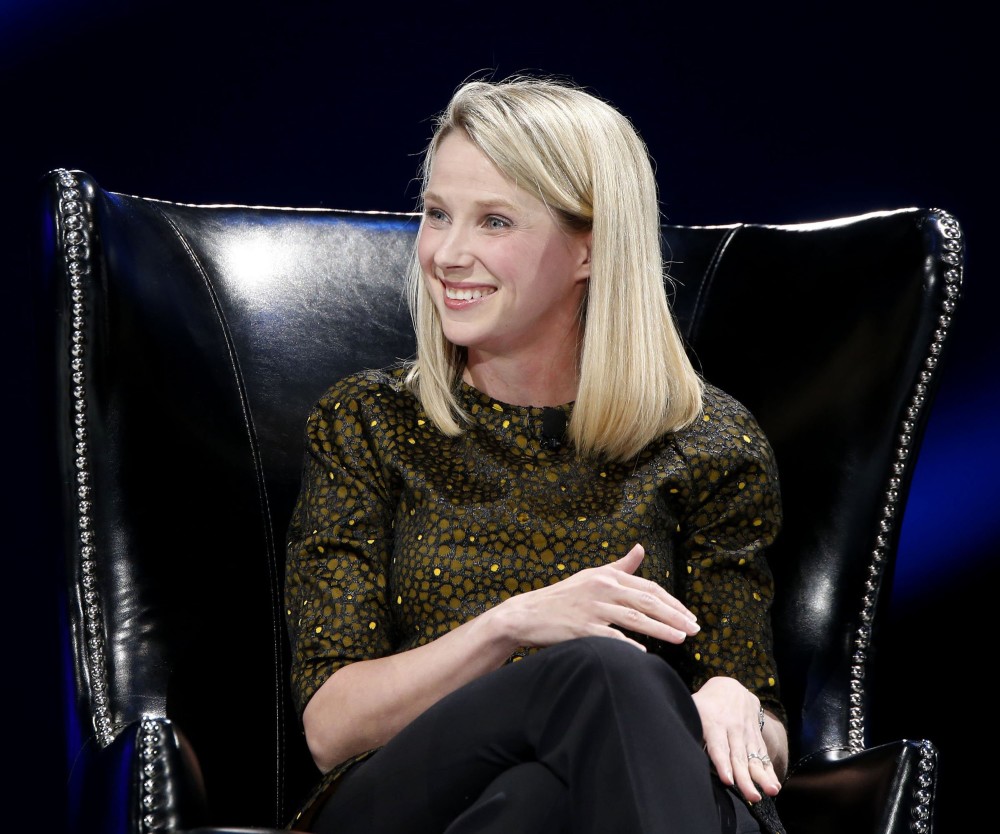By Andrew S. Ross
San Francisco Chronicle.
Heralded as “one of the most prominent women in Silicon Valley and corporate America,” when she took over Yahoo 2 1/2 years ago, Marissa Mayer is about to find out how tough it can be now that the shine has worn off.
Next Tuesday, Yahoo will report its fourth-quarter earnings. Mayer has also promised to say how she will “monetize” the asset that has helped keep her company afloat — Yahoo’s stock in the $243 billion Chinese e-commerce company Alibaba.
Not doing it in the way rebellious shareholders want her to will be “a clear indication to us that significant leadership change is required at Yahoo,” some investors warned.
“She’s under enormous pressure. She knows she needs to deal with it,” said Nicholas Carlson, author of the recently published “Marissa Mayer and the Fight to Save Yahoo.”
That was what she was brought in to do — save a company born as “Jerry and David’s guide to the World Wide Web” in 1994, after founders Jerry Yang and David Filo. With selected links to some of the growing profusion of websites, it was the indispensable guide, especially for newbies navigating this somewhat unfamiliar world.
It was a smashing success, at one time worth $96 billion, until the dot-com crash and the emergence of competitors like Google, which ate away at its business.
It went through a succession of would-be savior CEOs, including former Warner Bros. co-CEO Terry Semel, who turned down Microsoft’s $44.6 billion bid for the company in 2008; former Autodesk CEO Carol Bartz, famous for her F-bombs; and former PayPal President Scott Thompson, who lasted just 130 days before its was discovered that he fudged his resume.
Enter Mayer in July 2012. As vice president of search products and user experience at Google, she played major roles in the development of Google Maps, Gmail and a host of other applications. Often the public face of Google, she’s been a member of Fortune’s 50 Most Powerful Women in Business since 2008, and was greeted at Yahoo with a giant banner with her face and the word HOPE.
On the surface, Mayer has achieved a lot. Morale is reportedly up, and the company is better organized, if overstaffed, say analysts. Its stock price has tripled since the day she joined, closing at $47.63 on Tuesday, with a market cap of $44.4 billion, up from $19 billion when she joined.
Its market share of search, dominated of course by Google, has increased to 10.4 percent, the highest since 2009, and last month it replaced Google as the default search engine on Firefox’s newest version.
Way behind on mobile under previous CEOs, Yahoo now has 400 million monthly active mobile users, according to industry reports. With 195 million unique users, it leads Google, Microsoft and Facebook among desktop users. (Yes, they still exist.) Ad revenue, after falling steadily over the past two years, grew 2 percent in the last quarter, though its digital ad revenue is a fraction of Google’s or Facebook’s.
But through it all, Mayer has been operating under what Carlson’s book aptly labels “air cover” — a 40 percent stake in Chinese e-commerce company Alibaba, since reduced to 15 percent, worth approximately $37 billion. That’s what has made Yahoo stock attractive to investors, not Yahoo’s core products, which analysts calculate are worth very little in market terms.
Misteps by Mayer haven’t helped. For example, hiring Google colleague Henrique de Castro as chief operating officer for the princely sum of $62 million, then firing the largely ineffectual executive in charge of advertising 15 months later.
The billions spent on acquisitions of social media companies (Tumblr for $1 billion), content aggregators, video platforms, gaming sites, TV shows (most recently “Community,” dropped by NBC), hiring Katie Couric as a “global anchor” (for a reported $6 million a year) and former New York Times tech columnist David Pogue to front Yahoo Tech, have so far shown little in return financially.
Mayer wants Yahoo to become a major media player, evidenced by reports she was interested in buying CNN and Scripps Networks Interactive — the owner of several cable channels, including HGTV and the Food Channel. That news prompted the leader of the restive shareholders, Jeffrey Smith, managing member of Starboard Value, a New York hedge fund that owns 1 percent of Yahoo stock, to fire off a letter. It said investors were “increasingly concerned” at such reports, and demanded that Yahoo “significantly reduce costs to improve profitability in its core business and should be considering a combination with AOL.”
Most importantly, Mayer must accept a “tax efficient split” of its far-more-valuable Alibaba and Yahoo Japan holdings into a separate company, which, of course, existing Yahoo shareholders would retain a piece of — leaving Mayer to run Yahoo’s shrunken “core business.”
In other words, it’s his way or the highway.
So, what are her odds? “I think Mayer can win the fight to save Yahoo,” said Carlson, chief correspondent at Business Insider. “The easiest way for her to do that is to split the company into two. But it won’t be anywhere close a $45 billion company. She’ll be running a smaller company.”
Or, Mayer could choose an alternative method of financial and tax engineering — “a cash-rich split-off.” It would be an even more complicated maneuver that divides the company, but leaves the reborn Yahoo with a lot more cash along with its core business.
“The resurfacing of rumors about a cash-rich split-off at this juncture is particularly troubling given your acknowledgment at our meeting with you on October 27th that this option would be clearly inferior,” Smith wrote to Mayer.
buy tadalista generic buy tadalista online no prescription
Game on.
















































































































































































































































































































































































